(完整版)英语中介词to的用法归纳
- 格式:doc
- 大小:36.01 KB
- 文档页数:8
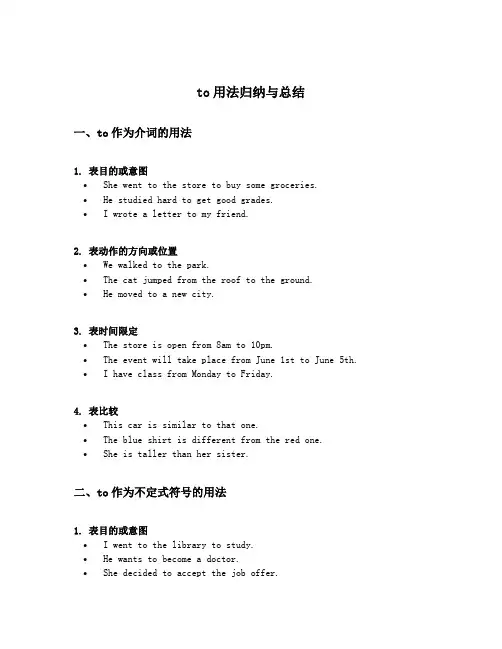
to用法归纳与总结一、to作为介词的用法1. 表目的或意图•She went to the store to buy some groceries.•He studied hard to get good grades.•I wrote a letter to my friend.2. 表动作的方向或位置•We walked to the park.•The cat jumped from the roof to the ground.•He moved to a new city.3. 表时间限定•The store is open from 8am to 10pm.•The event will take place from June 1st to June 5th.•I have class from Monday to Friday.4. 表比较•This car is similar to that one.•The blue shirt is different from the red one.•She is taller than her sister.二、to作为不定式符号的用法1. 表目的或意图•I went to the library to study.•He wants to become a doctor.•She decided to accept the job offer.2. 表结果或影响•The flowers need water to grow.•We need food to survive.•He exercised to lose weight.3. 与动词不定式连用,构成不定式短语•He is excited to go on vacation.•She is ready to start her new job.•They are eager to learn.4. 与形容词连用,构成形容词不定式短语•She is happy to help.•He is afraid to speak in public.•They are proud to be part of the team.三、其他常见用法1. 与动词的短语动词一起使用•I look forward to meeting you.•They are used to working long hours.•She objected to his idea.2. 表示比率或比例•The ratio of boys to girls is 2:1.•The price increased from $10 to $15.•The temperature dropped from 30°C to 15°C.3. 用于表达方式或方法•She prefers to walk rather than drive.•He learns best by listening to podcasts.•I like to study in a quiet environment.4. 用于表示对待或对方的方式•She was kind to her classmates.•They were rude to the waiter.•He is respectful to his elders.5. 用于表示认同或支持•I am open to new ideas.•They are opposed to the plan.•She is committed to the cause.四、注意事项•不定式符号不与进行时态连用,如”I am to go”是错误的,应为”I will go”。

介词to的常见用法介词to在英语中被广泛应用,具有多种用法和意义。
在语言学中,介词是一种词类,用于连接名词、代词或动词与其他句子成分,起到引导、定位或修饰的作用。
下面将详细介绍介词to的常见用法及其相应的例句。
表示方向与位置1.表示方向:介词to可用来表示某个目的地或方向。
例如,“I am going to the store.”(我要去商店。
)2.表示接触或靠近:当用于描述两个事物之间的接触或靠近关系时,常常使用介词to。
例如,“She sat next to me.”(她坐在我旁边。
)表示关系与所属3.表示关系:介词to还可以用来表示一种关系或连接,通常用于描述人际关系或情感联系。
例如,“I am married to him.”(我和他结婚了。
)4.表示所属:当表示某物属于另一物体或个体时,也常用介词to。
例如,“The keybelongs to the door.”(这把钥匙属于这扇门。
)表示时间与目的5.表示时间:在表示某一事件或动作发生的时间点或时期时,常常使用介词to。
例如,“The party starts at 7 o’clock.”(聚会在7点开始。
)6.表示目的:介词to还可用来表示一个目的或意图,通常用于不直接表达动作对象的情况。
例如,“I sent an email to her.”(我给她发送了一封邮件。
)表示比较与方法7.表示比较:当需要进行比较或对比时,可以使用介词to引出比较的对象。
例如,“This book is superior to that one.”(这本书比那本更好。
)8.表示方法:在介绍某一行动或过程的方法时,也可用介词to表示。
例如,“Shedanced to the music.”(她随着音乐跳舞。
)总的来说,介词to在英语中是一个非常常见且多功能的介词,具有多种用法和意义。
通过学习和掌握这些用法,可以更加准确地运用介词to,使语言表达更加清晰和流畅。
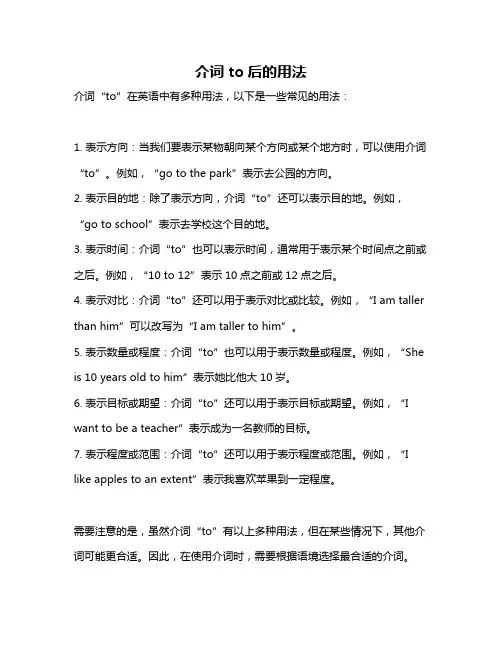
介词to后的用法
介词“to”在英语中有多种用法,以下是一些常见的用法:
1. 表示方向:当我们要表示某物朝向某个方向或某个地方时,可以使用介词“to”。
例如,“go to the park”表示去公园的方向。
2. 表示目的地:除了表示方向,介词“to”还可以表示目的地。
例如,“go to school”表示去学校这个目的地。
3. 表示时间:介词“to”也可以表示时间,通常用于表示某个时间点之前或之后。
例如,“10 to 12”表示10点之前或12点之后。
4. 表示对比:介词“to”还可以用于表示对比或比较。
例如,“I am taller than him”可以改写为“I am taller to him”。
5. 表示数量或程度:介词“to”也可以用于表示数量或程度。
例如,“She is 10 years old to him”表示她比他大10岁。
6. 表示目标或期望:介词“to”还可以用于表示目标或期望。
例如,“I want to be a teacher”表示成为一名教师的目标。
7. 表示程度或范围:介词“to”还可以用于表示程度或范围。
例如,“I
li ke apples to an extent”表示我喜欢苹果到一定程度。
需要注意的是,虽然介词“to”有以上多种用法,但在某些情况下,其他介词可能更合适。
因此,在使用介词时,需要根据语境选择最合适的介词。
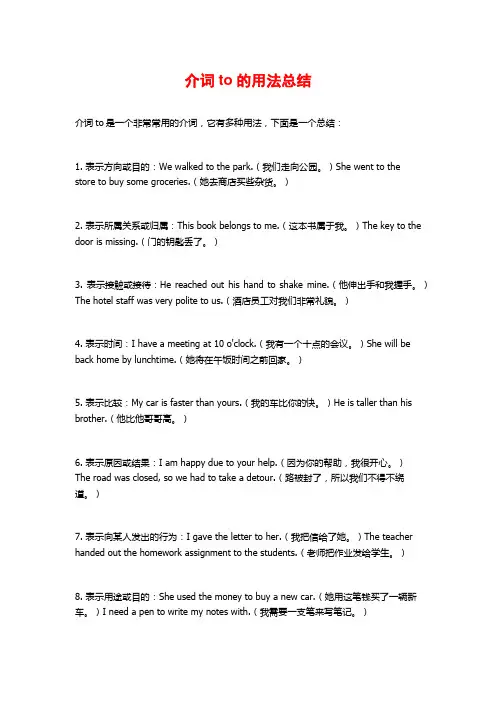
介词to的用法总结介词to是一个非常常用的介词,它有多种用法,下面是一个总结:1. 表示方向或目的:We walked to the park.(我们走向公园。
)She went to the store to buy some groceries.(她去商店买些杂货。
)2. 表示所属关系或归属:This book belongs to me.(这本书属于我。
)The key to the door is missing.(门的钥匙丢了。
)3. 表示接触或接待:He reached out his hand to shake mine.(他伸出手和我握手。
)The hotel staff was very polite to us.(酒店员工对我们非常礼貌。
)4. 表示时间:I have a meeting at 10 o'clock.(我有一个十点的会议。
)She will be back home by lunchtime.(她将在午饭时间之前回家。
)5. 表示比较:My car is faster than yours.(我的车比你的快。
)He is taller than his brother.(他比他哥哥高。
)6. 表示原因或结果:I am happy due to your help.(因为你的帮助,我很开心。
)The road was closed, so we had to take a detour.(路被封了,所以我们不得不绕道。
)7. 表示向某人发出的行为:I gave the letter to her.(我把信给了她。
)The teacher handed out the homework assignment to the students.(老师把作业发给学生。
)8. 表示用途或目的:She used the money to buy a new car.(她用这笔钱买了一辆新车。
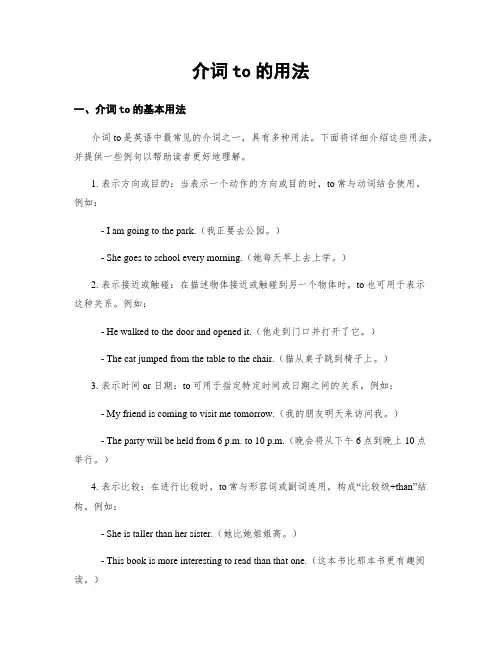
介词to的用法一、介词to的基本用法介词to是英语中最常见的介词之一,具有多种用法。
下面将详细介绍这些用法,并提供一些例句以帮助读者更好地理解。
1. 表示方向或目的:当表示一个动作的方向或目的时,to常与动词结合使用。
例如:- I am going to the park.(我正要去公园。
)- She goes to school every morning.(她每天早上去上学。
)2. 表示接近或触碰:在描述物体接近或触碰到另一个物体时,to也可用于表示这种关系。
例如:- He walked to the door and opened it.(他走到门口并打开了它。
)- The cat jumped from the table to the chair.(猫从桌子跳到椅子上。
)3. 表示时间 or 日期:to可用于指定特定时间或日期之间的关系。
例如:- My friend is coming to visit me tomorrow.(我的朋友明天来访问我。
)- The party will be held from 6 p.m. to 10 p.m.(晚会将从下午6点到晚上10点举行。
)4. 表示比较:在进行比较时,to常与形容词或副词连用,构成“比较级+than”结构。
例如:- She is taller than her sister.(她比她姐姐高。
)- This book is more interesting to read than that one.(这本书比那本书更有趣阅读。
)二、介词to连接的动词除了上述基本用法外,介词to还与特定的动词搭配使用,构成某些固定短语和表达方式。
1. 向某人(表示移交):give, hand, pass等- He gave the letter to his teacher.(他把信给了他的老师。
)- Can you pass the salt to me?(你能把盐递给我吗?)2. 对某人有影响:listen, talk, speak等- I like to listen to music when I study.(我喜欢在学习时听音乐。
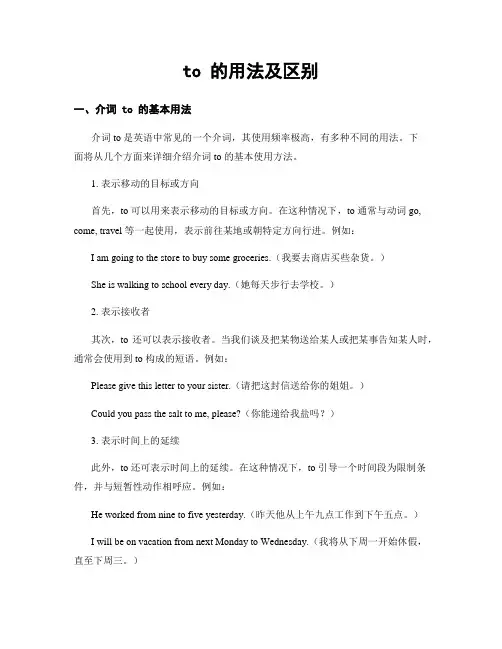
to 的用法及区别一、介词 to 的基本用法介词 to 是英语中常见的一个介词,其使用频率极高,有多种不同的用法。
下面将从几个方面来详细介绍介词 to 的基本使用方法。
1. 表示移动的目标或方向首先,to 可以用来表示移动的目标或方向。
在这种情况下,to 通常与动词 go, come, travel 等一起使用,表示前往某地或朝特定方向行进。
例如:I am going to the store to buy some groceries.(我要去商店买些杂货。
)She is walking to school every day.(她每天步行去学校。
)2. 表示接收者其次,to 还可以表示接收者。
当我们谈及把某物送给某人或把某事告知某人时,通常会使用到 to 构成的短语。
例如:Please give this letter to your sister.(请把这封信送给你的姐姐。
)Could you pass the salt to me, please?(你能递给我盐吗?)3. 表示时间上的延续此外,to 还可表示时间上的延续。
在这种情况下,to 引导一个时间段为限制条件,并与短暂性动作相呼应。
例如:He worked from nine to five yesterday.(昨天他从上午九点工作到下午五点。
)I will be on vacation from next Monday to Wednesday.(我将从下周一开始休假,直至下周三。
)二、to 的区别及搭配词除了以上的基本用法外,to 还有几个与之相关的词语,在使用时需要注意其区别。
1. To 和 too首先,我们来看一下 to 和 too 的区别。
虽然它们读音相同,但意义截然不同。
To 是介词,而 too 是副词,表示“太”或“也”。
例如:I want to go to the movies tonight.(我今晚想去看电影。
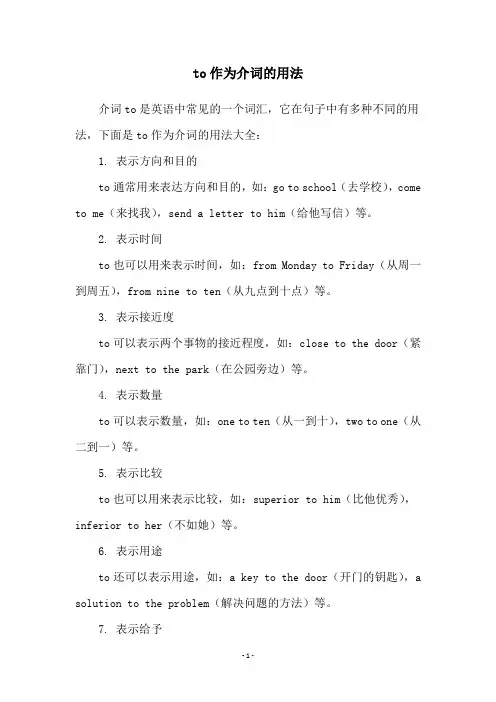
to作为介词的用法
介词to是英语中常见的一个词汇,它在句子中有多种不同的用法,下面是to作为介词的用法大全:
1. 表示方向和目的
to通常用来表达方向和目的,如:go to school(去学校),come to me(来找我),send a letter to him(给他写信)等。
2. 表示时间
to也可以用来表示时间,如:from Monday to Friday(从周一到周五),from nine to ten(从九点到十点)等。
3. 表示接近度
to可以表示两个事物的接近程度,如:close to the door(紧靠门),next to the park(在公园旁边)等。
4. 表示数量
to可以表示数量,如:one to ten(从一到十),two to one(从二到一)等。
5. 表示比较
to也可以用来表示比较,如:superior to him(比他优秀),inferior to her(不如她)等。
6. 表示用途
to还可以表示用途,如:a key to the door(开门的钥匙),a solution to the problem(解决问题的方法)等。
7. 表示给予
to可以表示给予,如:give a present to him(给他礼物),offer help to her(向她提供帮助)等。
8. 表示形式
to还可以表示形式,如:convert from liquid to gas(从液体转化为气体),change from red to blue(从红色变为蓝色)等。
以上是to作为介词的用法大全,希望对你的学习有所帮助。
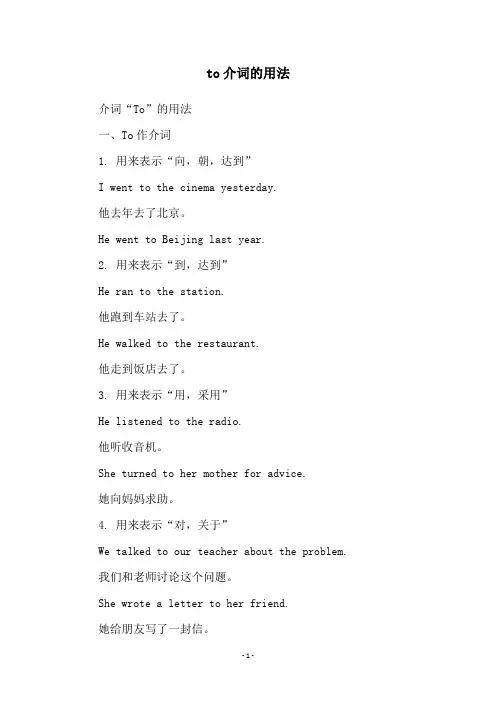
to介词的用法介词“To”的用法一、To作介词1. 用来表示“向,朝,达到”I went to the cinema yesterday.他去年去了北京。
He went to Beijing last year.2. 用来表示“到,达到”He ran to the station.他跑到车站去了。
He walked to the restaurant.他走到饭店去了。
3. 用来表示“用,采用”He listened to the radio.他听收音机。
She turned to her mother for advice.她向妈妈求助。
4. 用来表示“对,关于”We talked to our teacher about the problem.我们和老师讨论这个问题。
She wrote a letter to her friend.她给朋友写了一封信。
5. 用来表示“给,传递,送到”He gave the present to his mother.他把礼物送给了他的妈妈。
She sent the letter to her brother.她把信给弟弟。
6. 用来表示“靠近,相近,接近”The dog came to us.狗走近我们。
The house is close to the river.这房子离河很近。
二、To作介短语1. to one's surprise:使某人惊讶的是To our surprise, he came here on time.令我们惊讶的是,他准时来了。
2. to begin with:首先To begin with, you should prepare enough materials.首先,你应该准备足够的材料。
3. to sb's delight:使某人高兴的是To their delight, they got excellent grades.令他们高兴的是,他们考了优秀的分数。
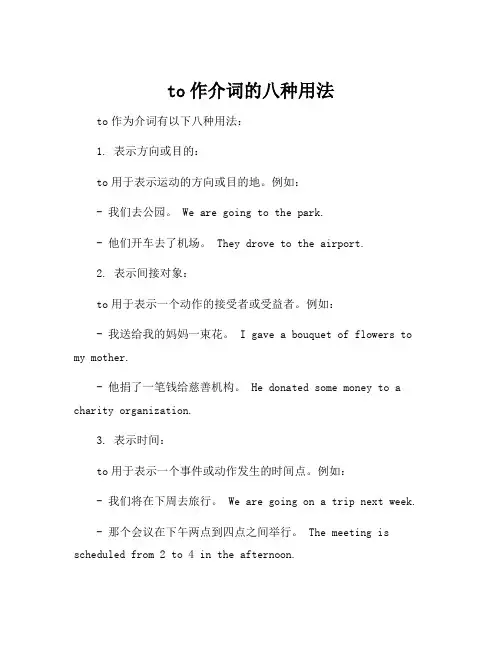
to作介词的八种用法to作为介词有以下八种用法:1. 表示方向或目的:to用于表示运动的方向或目的地。
例如:- 我们去公园。
We are going to the park.- 他们开车去了机场。
They drove to the airport.2. 表示间接对象:to用于表示一个动作的接受者或受益者。
例如:- 我送给我的妈妈一束花。
I gave a bouquet of flowers to my mother.- 他捐了一笔钱给慈善机构。
He donated some money to a charity organization.3. 表示时间:to用于表示一个事件或动作发生的时间点。
例如:- 我们将在下周去旅行。
We are going on a trip next week.- 那个会议在下午两点到四点之间举行。
The meeting is scheduled from 2 to 4 in the afternoon.4. 表示比较:to用于表示比较的标准,常与形容词或副词连用。
例如:- 这个苹果比那个大。
This apple is bigger than that one.- 她跑得很快。
She runs fast.5. 表示对待或持有观点:to用于表示对待某人或某事物的态度或观点。
例如:- 我对他很友好。
I am friendly to him.- 他对这个计划持怀疑态度。
He is skeptical about this plan.6. 表示比例、比率或速度:to用于表示比例、比率或速度。
例如:- 他们的合作比率是1比3。
Their collaboration ratio is 1 to 3.- 他们走得太快,我跟不上。
They walk too fast for me to catch up.7. 表示困境或状态:to用于表示某人处于某种状态或困境中。
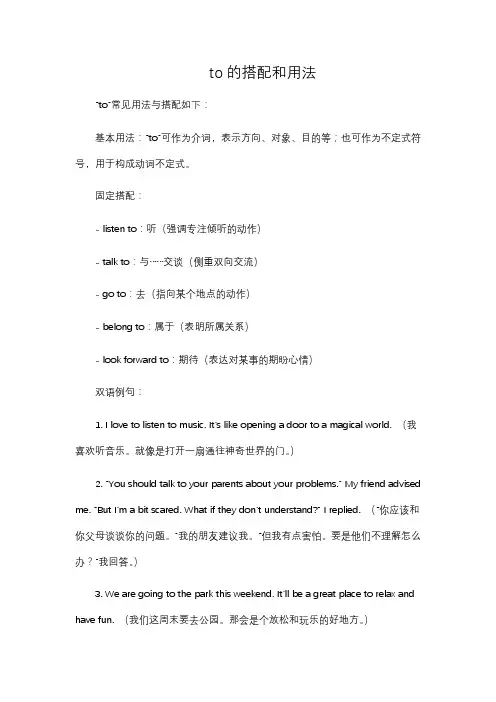
to的搭配和用法“to”常见用法与搭配如下:基本用法:“to”可作为介词,表示方向、对象、目的等;也可作为不定式符号,用于构成动词不定式。
固定搭配:- listen to:听(强调专注倾听的动作)- talk to:与……交谈(侧重双向交流)- go to:去(指向某个地点的动作)- belong to:属于(表明所属关系)- look forward to:期待(表达对某事的期盼心情)双语例句:1. I love to listen to music. It's like opening a door to a magical world. (我喜欢听音乐。
就像是打开一扇通往神奇世界的门。
)2. “You should talk to your parents about your problems.” My friend advised me. “But I'm a bit scared. What if they don't understand?” I replied. (“你应该和你父母谈谈你的问题。
”我的朋友建议我。
“但我有点害怕。
要是他们不理解怎么办?”我回答。
)3. We are going to the park this weekend. It'll be a great place to relax and have fun. (我们这周末要去公园。
那会是个放松和玩乐的好地方。
)4. This book belongs to me. It's like my precious treasure. (这本书属于我。
它就像我的珍贵宝藏。
)5. I'm really looking forward to the party. It's gonna be a blast, isn't it? (我真的很期待派对。
肯定会超级好玩的,不是吗?)6. She used to dance a lot. But now she hardly has time. It's such a pity. (她过去常常跳舞。
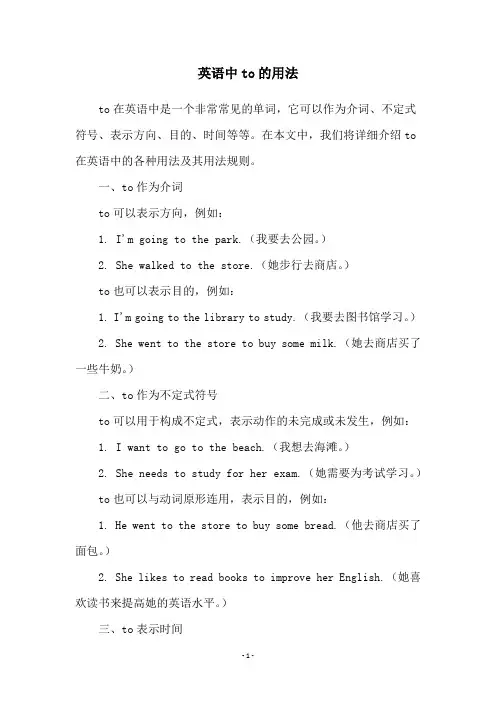
英语中to的用法to在英语中是一个非常常见的单词,它可以作为介词、不定式符号、表示方向、目的、时间等等。
在本文中,我们将详细介绍to 在英语中的各种用法及其用法规则。
一、to作为介词to可以表示方向,例如:1. I'm going to the park.(我要去公园。
)2. She walked to the store.(她步行去商店。
)to也可以表示目的,例如:1. I'm going to the library to study.(我要去图书馆学习。
)2. She went to the store to buy some milk.(她去商店买了一些牛奶。
)二、to作为不定式符号to可以用于构成不定式,表示动作的未完成或未发生,例如:1. I want to go to the beach.(我想去海滩。
)2. She needs to study for her exam.(她需要为考试学习。
) to也可以与动词原形连用,表示目的,例如:1. He went to the store to buy some bread.(他去商店买了面包。
)2. She likes to read books to improve her English.(她喜欢读书来提高她的英语水平。
)三、to表示时间to在英语中也可以表示时间,例如:1. The meeting will start at 9 o'clock sharp.(会议将在9点钟准时开始。
)2. The party will last from 6 to 9 pm.(派对将从下午6点到9点持续。
)四、to作为连词to也可以作为连词,连接两个并列的名词或代词,例如:1. She gave the book to Tom and Jerry.(她把书给了汤姆和杰瑞。
)2. I prefer coffee to tea.(我喜欢咖啡胜过茶。
介词to的常见用法一、介词to表示“向、至”1、说明方向:We'll go to Beijing. 我们将去北京。
2、表示地点:We are at the library. 我们在图书馆。
3、说明持续时间:He has been in China for two years. 他在中国已经有两年了。
4、表明临近,表示接近:She came close to me. 她靠近我。
5、说明目标:John goes to school. 约翰去学校。
6、表示被动:The book was translated into English. 这本书被翻译成英语。
7、表示将来时间:We will go to the beach tomorrow. 我们明天去海滩。
9、表示某事情被带到某处:He [brought the food] to us. 他把食物带给我们了。
10、表示将某物放置在某处:She put the book to the table. 她把书放在桌上。
11、表示由某处到某处:She went from Beijing to Shanghai. 她从北京到上海去了。
12、表示正在做某事:He is going to work. 他去上班了。
13、表示达到某种状态:She came to life. 她活了过来。
14、表示特别要求:They asked us to come early. 他们要求我们早点来。
15、表示传递、转至:He passed the message to me. 他把信息传递给我了。
2、表示对某物:He listened to the music. 他听音乐。
4、表示对某种状态:She awoke to find herself alone. 她醒来发现自己身边只有自己。
9、表示对传统或信条的认同:They adhered to the custom. 他们坚持遵守这种习俗。
介词to的用法总结一、to 介词的基本使用和意义在英语中,介词to是最常用的介词之一。
它有多种用法和意义,在不同的情境下具有不同的功能。
以下将对to介词进行总结和解释。
1. 表示方向或目标to 介词常被用来表示动作或行为的目标或方向。
例如:- We went to the park.(我们去了公园)- I am going to London for vacation.(我要去伦敦度假)2. 表示时间to 也可用来表示时间点或时间段的延续。
例如:- The meeting will start from 9 am to 12 pm.(会议将从上午9点开始到中午12点)- She works from Monday to Friday.(她周一至周五工作)3. 表示间接对象to 还可用来表达一个行为所作用的对象,即“给某人”或“对某人”。
例如:- I gave my birthday gift to my best friend.(我把生日礼物给了我最好的朋友)- They sang a song to the audience.(他们给观众唱了一首歌)4. 表示比较在进行比较时,to 可以与形容词和副词连用,形成一个比较结构。
“A + be + 形容词/副词+ to + B”。
例如:- This book is more interesting to read than that one.(这本书比那本书更有趣)- He speaks English fluently, but she speaks it better.(他说英语流利,但她说得更好)5. 用于不定式to 也常用来引导不定式,表示某个动作或行为的目的、目标或结果。
例如:- I need to finish my homework before dinner.(我需要在晚饭前完成我的作业)- She hopes to become a doctor in the future.(她希望将来能成为一名医生)二、to 介词在常见短语中的应用1. look forward to 盼望这个短语表示期待某件事情发生。
to的五种用法一、to作为介词的用法1. 表示方向或目的地例如:I want to go to the park. (我想去公园。
)2. 表示时间范围例如:I will stay here from Monday to Friday.(我将在这里待到周一到周五。
)3. 表示接触或触及例如:She put her hand to her chest.(她把手放在了她的胸口。
)4. 表示与某事物相关或接触例如:He is used to living in a big city.(他已经习惯了住在大城市。
)5. 表示关系或比较例如:This book is similar to that one.(这本书和那本书相似。
)二、to作为不定式标志的用法1. 表示目的或目标例如:I want to learn how to play the piano.(我想学会弹钢琴。
)2. 表示原因或动机例如:He came to visit me to apologize.(他来拜访我是为了道歉。
)三、to作为介词或连词的用法1. 介词to与动词不定式连用例如:He is looking forward to meeting you.(他期待着见到你。
)2. 与形容词连用,表示状态或感受例如:I am happy to see you.(见到你我很开心。
)四、to作为介词的其他用法1. 表示属于或归属例如:This book belongs to me.(这本书属于我。
)2. 表示被动或遭遇例如:She was subjected to criticism.(她遭受了批评。
)3. 表示启示或反应例如:The news came as a shock to her.(这个消息让她感到震惊。
)五、to作为短语动词的一部分例如:I need to look after my dog.(我需要照顾我的狗。
)总结:to作为一个多功能的词,在不同的语境中有着不同的用法。
to的介词用法归纳总结“to” 是一个多功能的介词,使用频率非常高。
其常见用法总结如下:1. 表示方向或目的:- We went to the park.- I am going to the store.- She is going to school.2. 表示给予或授予:- I gave a gift to my friend.- He handed the book to me.- She sent an email to her boss.3. 表示时间:- The meeting is scheduled for 2 p.m. to 4 p.m.- The store is open from Monday to Friday.- She will be on vacation from July 1st to July 15th.4. 表示传送或传递:- I passed the message to him.- Please give this package to her.- She whispered something to me.5. 表示比较:- This book is similar to that one.- He is taller than his brother.- She is smarter than most students in her class.6. 表示归属:- The car belongs to my father.- The house is rented to a family.- The laptop is assigned to me.7. 用于动词不定式:- I want to go to the concert.- She likes to read books.- He decided to take a break.需要注意的是,以上只是一些常见的“to”介词用法,实际上,根据上下文和动词的不同,可能还会有其他用法。
to的用法归纳总结to是一个非常常用的英语词汇,它有多种用法和含义。
以下是一些常见的用法归纳总结:一、作为介词:1.表示方向或目的地:例如,go to school(去学校),move to thecity(搬到城市)。
2.表示时间:例如,from morning to night(从早到晚),from Mondayto Friday(从周一到周五)。
3.表示范围或限度:例如,from A to Z(从A到Z),from easy todifficult(从简单到困难)。
二、作为副词:用于表示程度或范围:例如,from to time(不时地),to some extent (在某种程度上)。
三、作为名词:表示某个具体的目标或目的地:例如,the journey to the moon(登月之旅),the move to the new house(搬到新房子)。
四、作为形容词:用于表示某个特定的人或事物:例如,the key to the door(门的钥匙),the solution to the problem(问题的解决方案)。
五、作为动词不定式的标记:1.用于表示目的或意图:例如,I want to eat(我想吃),She plansto travel(她计划旅行)。
2.用于表示建议、命令或请求:例如,You should go to bed early(你应该早点睡觉),He asked me to help him(他让我帮助他)。
六、其他用途:1.作为连接词的一部分,用于表示比较或对比。
例如,在短语 from... to...中,它可以帮助表达范围或变化,如 The weather changed from cold to hot.(天气从冷变热)。
2.在某些固定短语或习语中,to也扮演着重要角色。
例如,get down to business(开始认真处理事务)或 look forward to(期待)。
关于to的知识点总结to是一个多功能的词语,在英语中广泛使用。
它可以作为介词、不定式标志、动词不定式符号和复合介词使用。
在不同的语境中,to具有不同的含义和用法,以下将详细介绍to 的各种用法和知识点。
一、to作为介词1. 表示方向或目的:在这种情况下,to用于表示一个人、事物或动作的方向或目的。
例如:We are going to the park.(我们去公园。
)I'm going to the library to study.(我去图书馆学习。
)2. 表示时间:to可以用作介词,表示一个动作或事件发生的时间。
例如:I will go to Japan next month.(我下个月会去日本。
)She usually goes to bed at 10 o'clock.(她通常在十点钟上床睡觉。
)3. 表示接触或联系:to还可以用作介词,表示两个人或物体之间的接触或联系。
例如:I gave the book to her.(我把书给了她。
)He is talking to his friend.(他正在和他的朋友交谈。
)4. 表示比较:to可以用作介词,表示两个事物之间的比较。
例如:This book is superior to that one.(这本书比那本书好。
)He is taller than his brother.(他比他的兄弟高。
)5. 表示对待或行为对象:to还可以用作介词,表示对待或行为的对象。
例如:He was kind to the old lady.(他对那位老太太很和蔼。
)Please be nice to your sister.(请对你妹妹好一点。
)二、to作为不定式标志不定式是动词的一种形式,它前面通常有to作为标志,并且不定式可以作为名词、形容词或副词。
to作为不定式标志有以下几种用法:1. 作为动词的不定式:to可以作为动词的不定式标志,表示动作或状态的不确定或未定。
英语中介词to的用法归纳一:表示相对,针对be strange (common, new, familiar, peculiar, distinct, sensitive, immune, vulnerable, indispensable) toAir is indispensable to life.Aircrafts are vulnerable to interference caused by radiation. This injection will make you immune to infection.二:表示对比,比较1:以-ior结尾的形容词,后接介词to表示比较,如:superior ,inferior,prior,senior,juniorThe quarrel happened prior to my arrival.2:一些本身就含有比较或比拟意思的形容词,如equal,similar,equivalent,analogousA is similar toB in many ways.3:表示一些先后顺序的形容词,如:second,subsequent,next,preliminary,preparatorySubsequent to the war,they returned to their hometown.4: to也偶尔出现在个别动词之后,与动词形成固定词组,表示比较,如:prefer to,compare to,in contrast to compare to sth.表示比喻或比拟,而compare with sth.表示比较,如:World is usually compared to a stageCompared with his past,he has changed a lot.Prefer的正确句型是:prefer A to B或prefer doing A to doing B,但当prefer后接动词不定式时,表示比较的介词to就要改成rather than ,如:The undaunted soldier preferred death to surrender.Many people prefer spending money to earning money.They prefer to pursue careers rather than remain home as house wives.5: to与及个别的名词构成比较之意,如:alternativeGoing to an under water concert is a great alternative to going to dinner.三: 表示修饰关系1:表示回复,反应意思的词,如:answer to question,solution to problem,response to inquiry,reaction to proposal,reply to letter2:表示建筑构件的词汇,如:entry,entrance,approach,access,passage,exit,vent,path the approach to a bridge引桥the approach to scienceHalf of the population was estimated to have no access to the health service.The access to education 接受教育的机会The access to medical care 享受公费医疗的权利3: 表示人物职位和官衔的词,如:assistant to manager,ambassador to Spain, successor to tradition, heir to throne,deputy to the National People’s Congress advisor to the Prime Minister4: 表示权利和许可的词汇,如:right,admissionThe employee finally got the admission to the boardroom. Everyone has an equal right to ……..5:表示栅栏或障碍的词汇,如:bars to development,the barrier to progress6:表示与书籍,文本相关的词,如:introduction to passage.7: 表示恭喜或是祝贺,如:The director proposed a toast to the health of the guests. Let’s drink to Dick’s success in business8:另外还有一些名词符合这种用法,有的具有两者息息相关,缺一不可的含义.如:key to door,invitation to party,guide to action,limitation to life,accessory to school四: to还具有依据,伴随,和着节奏的含义,如:sing to piano, chance to the tune, stamp to the rhythm of the song, add salt to taste(一):表示相关联,相连接,如:be related to,be relative to,in relation to,be relevant to,link toInvestigate all the facts related to the problem.People often linked walth to happiness.(二):表示反对和赞同。
1:to引导的表示反对,抗拒,对抗意义的词组。
Be opposed to,be oppsist to,be contrary to,be adverse to,be resistant to,be contradictory to,object to,oppose to,deny tp,be aline toThese buildings are resistant to earthquake.They are to tally opposed to any changes being made in the plans.2:to引导的表示同意,赞同意义的词组:consent to,subseribe to, The employer consented to give him a salary raise.表示调整,使符合,使适应的含义,如:adapt to,commodate to, adjust to,conform to,habituate to,fit to,suitto,correspond to,cater toShe tried to habituate herself to the style of plain living. Your action should conform to the interests of the people. They offered various foods to cater to the need of customers. His words doesn’t fit to his actions.Suit your writing style to the masses.3: 表示投降,屈服,服从的含义,如:be subject to,be subordinate to,submit to,subject to,surrender to,give into,confess to,admit to.The minority is subordinate to the majority少数服从多数Countries nearby oceans are always subject to earthquake.He confessed to having robbed the woman of her wallet. We’re not the kind of p eople to yield to any military threat. 五: 表示趋势或倾向,如:tend to,be prone to,be inclined to,be apt to,be liable toHe’s liable to seasickness.You are liable to come to wrong conclusion.六: 表示对事情的坚持与执着,如:sick to,hold o,adhere to,cling toHe still holds on to his original views.七: 表示约束,局限,如:limit to,confine to,resrict toHe’s confin ed to the house by illness.He confined his remarks to scientific mangement.八: 表示一种习惯或是一种适应性,如:get (be) to,used to,be accustomed toFinally,the students got used to my teaching method.九: 表示起因和原由,如:owing to,due to,thanks to,attribute to,come down toThe flight was cancelled due to the thick fog.The famous artist attributed his success to his wife.十: 表示目的或结果,如:aim to,lead to,give rise toI aim to be an excellent college teacher.His conceit lead to his failure.These bad condition has given rise to a lot of crises十一: 表示命运,注定,如:be doomed to,be destined to,All military adventures by the two super powers are doomed to fail.十二: 表示数量上的积累或增加,如:in addition to,add to,amount toIn addition to relief supplies,he also presented with some money.The annual output of steel amounts to 1200 tons.十三: 表示全身心投入的含义,如:be addicted to,contribute to,devote to,commit toHe is determined to devote all his life to his.十四: 表示展望或是回顾,如:look forward to反date back toThe church dates back to the 13th century.十五: 表示方位概念.如:close to,next toI don’t like wool next to my skin.十六: 表示依靠或借助,如:resort to,turn to,appeal to,He usually appeals to arms to settle the territory dispute. 十七: 表示有关注,关于: as to,with regard to十八: 表示关注或重视,如:pay attention to,attach to,We should attach primary importance to job training.十九: 表示依据或是根据,如:according to,in proportion toAccording to today’s newspaper,the match will be postponed. The lending countries subscribe towards capital stock in proportion to heir economic importance.二十: 表示应该或必须含义的句式,如:It’s time to get up.We are supposed to get here at seven.It’s up to this country to ban nuclear weapons.常用词组respond to(反应), appeal to(吸引), catch on to(理解), listen to (收听),used to(过去常常), give birth to,attend to(照料), see to(负责), be entitled to(有权), belong to(属于), come to(苏醒), stand up to(勇敢面对), help oneself to(请自便), refer to,to the point(切题),Train them to stand up to any severe test in hard.The ticket entitled you to a free meal in the luxury hotel. See to it that the children get a hot meal after their swim. You will catch on to the job shortly after wards.People usually refer to television for up-to-the-minute news.。